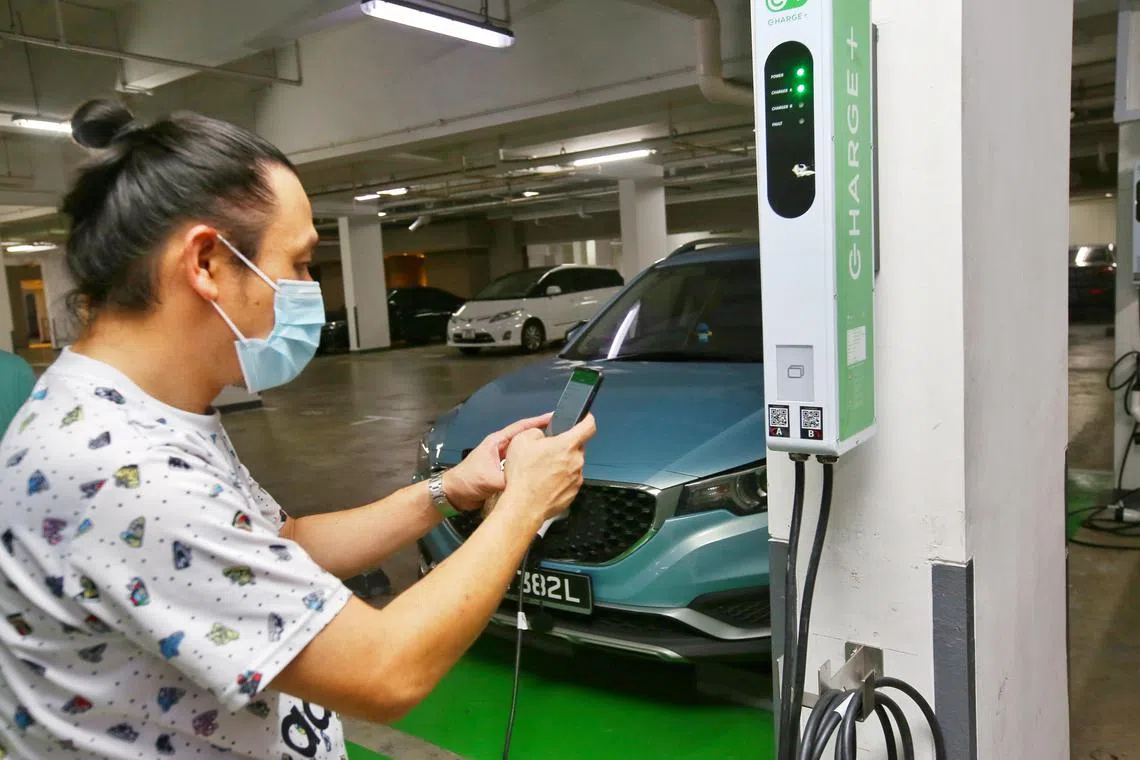S’pore to roll out green transport initiatives, including electrifying airside vehicles
Sign up now: Get ST's newsletters delivered to your inbox

A grant that co-funds the installation of EV chargers in condominiums will be extended by two years to December 2025.
PHOTO: LIANHE ZAOBAO
SINGAPORE - Singapore will reduce its domestic emissions by rolling out various green initiatives across the land, air and sea transport sectors.
Transport Minister S. Iswaran on Friday outlined the various measures, which include electrifying the public bus fleet, airside vehicles and harbour craft, as well as a new $50 million programme to support projects that cut carbon emissions in the aviation sector.
A grant that co-funds the installation of electric vehicle (EV) chargers in condominiums will be extended by two years to December 2025 as part of the drive to provide more charging infrastructure.
The Electric Vehicle Common Charger Grant co-funds up to 50 per cent of the cost of smart chargers, capped at $4,000 per charger.
Launched in July 2021,
The Land Transport Authority (LTA) said the grant extension will complement changes to the law that make it easier to install chargers in condominiums by lowering the threshold for approval from 90 per cent to 50 per cent.
Responding to Mr Gan Thiam Poh (Ang Mo Kio GRC), Mr Iswaran said the LTA will call a tender for 400 new electric buses in March.
From December 2024, these buses will start replacing diesel-powered ones that will be reaching their 17-year statutory lifespan. They will join the earlier batch of 60 electric buses that are already in service.
Based on the trial of these buses, the higher upfront costs are expected to be offset by lower operating costs in the long run, Mr Iswaran said.
The target is for half of the public bus fleet to be electric by 2030. There were 5,847 public buses as at end-2022.
More EV chargers will be installed in bus depots in tandem, including the upcoming depots in Sengkang West, Gali Batu, East Coast, Kim Chuan and Tengah. Chargers have been installed at the Bulim, Seletar, Loyang, Bedok and Bukit Panjang depots.
Turning to the electrification of airside vehicles, Mr Iswaran said his ministry wants all such vehicles to run on cleaner energy by 2040. Today, about 20 per cent of the 2,500 airside vehicles are electric.
From 2025, all new light vehicles – cars, vans and minibuses – to be used on the airside will have to be EVs. This applies to certain heavy vehicles such as tractors and forklifts too, he said.

Correspondingly, the Changi Airport Group (CAG) will also be putting in grid and infrastructure upgrades needed to power the EVs. Mr Iswaran said CAG has installed about 100 EV charging stations to date and will increase this to more than 300 over the next few years.
Trials on the use of renewable diesel will also be conducted, especially for specialised airport ground handling vehicles that do not have electric models.
To encourage the aviation sector to step up its sustainability efforts, the Government will establish a $50 million Aviation Sustainability Programme, Mr Iswaran added.
The programme will provide up to 70 per cent of funding for sector-wide projects that go towards cutting carbon emissions, among other sustainability-related areas. Projects at the company level can receive up to 50 per cent funding.
The criteria to qualify for the funding support include whether the proposed project involves partnerships with other parts of the aviation sector.
The Civil Aviation Authority of Singapore said it will make a first call for proposals from April 1 to April 30.
On the maritime front, Mr Iswaran said the harbour craft sector will be required to achieve net-zero emissions by 2050. There are currently about 1,600 harbour craft licensed by the Maritime and Port Authority of Singapore (MPA).
From 2030, MPA will require harbour craft – which refer to any kind of vessel that plies only within Singapore waters – to be either fully electric, ready to run on pure biofuels or compatible with so-called net-zero fuels such as hydrogen.
Owners of ships that are affected will have to work with MPA from 2027 to make the transition.
Various companies have embarked on efforts to go electric. The MPA is helping the likes of Eng Hub Shipping to convert its 30-seater ferry to an electric vessel.
Shipping company Lita Ocean and Yinson Green Technologies are building a new fully electric lighter craft with battery swopping technology under a consortium led by SeaTech Solutions, a company that specialises in ship design and building. These boats are slated to start testing later in 2023.



